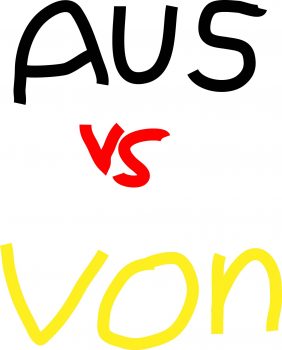Search Results
Aus vs. Von Posted by Sten on Jul 20, 2014
In German, the issue between von and aus is not a very prevalent one. But it can be confusing when learning German from English, since von and aus are both used for its English equivalent “from.” So, here is a clarification where von is used, and where aus is used in cases where they can…
Meinem, deinem, ihrem, unserem, etc.: German possessive pronouns in the dative case Posted by Sandra Rösner on Jan 21, 2013
In two of my previous post, I have already written about possessive pronouns in the nominative case and possessive pronouns in the genitive case. Now, I would like to continue with the third case or dative case. In general, the dative case shows possession. That is, when you want to use a possessive pronoun in…
Mnemonics – Eselsbrücken Posted by jan on Nov 21, 2012
If you run into problems with a certain word or grammar rule while learning German, maybe one of the following mnemonics might help! But a little German is required to get them anyway… Großschreibung von Nomen: Sei doch schlau und merk dir bloß: Nomen schreibt man immer groß! -ung, -heit, -keit ein Nomen steht bereit. -schaft, -tum…
German adjectives, part 2 – The weak declension Posted by Sandra Rösner on Jun 22, 2012
In my last post I began to talk about forming simple sentences with adjectives in German. You learned that there is no need to decline adjectives in so-called “to be” sentences or, in other words, when you put the adjective after the noun. Unfortunately, things are getting more complicated when you want to put the…
Compound words: Das Fugen-s im Deutschen – The linking “s” in German, part 2 Posted by Sandra Rösner on Feb 24, 2012
The German language is very productive in compounding words. It is virtually possible to great a never-ending word. Of course, Germans do not carry word compounding to extremes, that is, compound words of everyday language do never consist of more than two or three separate words. Anyway, this characteristic of the German language can…
Compound words: Das Fugen-s im Deutschen – The linking “s” in German, part 1 Posted by Sandra Rösner on Feb 22, 2012
You have probably come across German compound words that are linked with an “s”, called linking “s” in English and Fugen-s in German, for example: die Liebesgeschicht – love story der Gerechtigkeitssinn – sense of justice die Schönheitskur – beauty treatment But other words do not contain this linking “s”, for example: die Tee-kanne…
Using apostrophes in German Posted by Sandra Rösner on Feb 20, 2012
One of our Facebook followers asked to do a spell and grammar check of her German composition. She used the greeting “Wie gehts, wie stehts?”, which simply means “How are things?” Immediately, I suggested that she should use apostrophes when using the expression above, and write “Wie geht’s, wie steht’s?” instead. But is her version…



